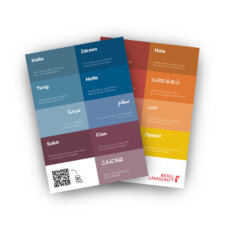In an emergency
Help in emergencies is available here:
- Police emergency hotline (24 hours), tel. 112 or 117, www.polizei.bl.ch
- Women's Refuge of Basel-Stadt and Baselland (24 hours), tel. 061 681 66 33, www.frauenhaus-basel.ch
- Medical emergency hotline (24 hours), tel. 061 261 15 15, www.mnzbasel.ch
- Kantonsspital Baselland emergency units (Liestal, Laufen, Bruderholz, 24 hours), www.ksbl.ch/notfall
- Psychiatry service of Baselland (24 hours), tel. 061 553 56 56, www.pbl.ch/notfall



